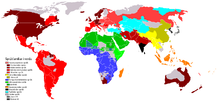Lyenlilyem
zop a̱lyem a̱tyubishyi
Lyenlilyem yet zop zi̱zop a̱lyem nang a̱tyubishyi lyiat a̱ni ja.[1][2] Si̱ a̱hwa si̱ fa ku yet a̱za̱za̱rak, a̱kokwak, a̱tsotswat ma̱ng a̱gba̱mgbam zop a̱lyem wa, di̱ nfam yet ma̱ng nghwughwu lilyem na.[3] Lyenlilyem byia̱ a̱ka̱ta ma̱ng kuzang fam a̱lyem, ma̱ng nvak zop ma̱ng tswang lilyem. Á̱ ngyei a̱tyu a̱ byia̱ lyen lilyem a̱tyulyenlilyem wa.
lyenlilyem
| Tafa | humanities, social science |
|---|---|
| Yet kap | language arts, language studies |
| Is the study of | a̱lyem, languoid class, languoid, zwa-a̱lyiat, a̱lyem |
| Nkhang | history of linguistics |
| Practiced by | linguist, linguistics teacher |
| Entry in abbreviations table | dilb., лінгв. |
| Stack Exchange site URL | https://linguistics.stackexchange.com |

Ya̱fang
jhyuk- ↑ Halliday, Michael A.K.; Jonathan Webster (2006). "On Language and Linguistics" (di̱n Shong). Continuum International Publishing Group. P. vii. ISBN 978-0-8264-8824-4
- ↑ What is Linguistics? | Linguistic Society of America Archived 2022-02-08 at the Wayback Machine (di̱n Shong). www.linguisticsociety.org
- ↑ Crystal, David (1981). Clinical linguistics (di̱n Shong). Wien: Springer-Verlag. P. 3. ISBN 978-3-7091-4001-7. OCLC 610496980. What are the implications of the term "science" encountered in the definition on p. 1? Four aims of the scientific approach to language, often cited in introductory works on the subject, are comprehensiveness, objectivity, systematicness and precision. The contrast is usually drawn with the essentially non-scientific approach of traditional language studies—by which is meant the whole history of ideas about language from Plato and Aristotle down to the nineteenth century study of language history (comparative philology).